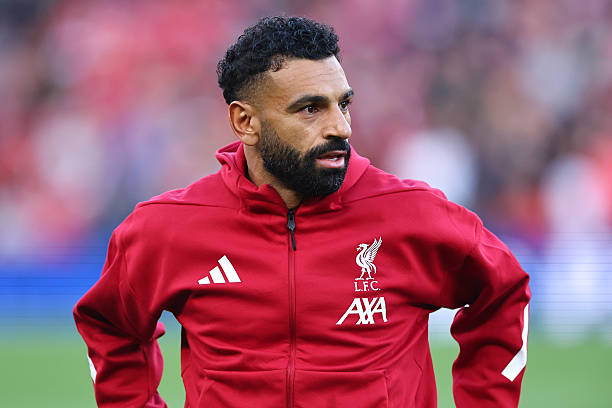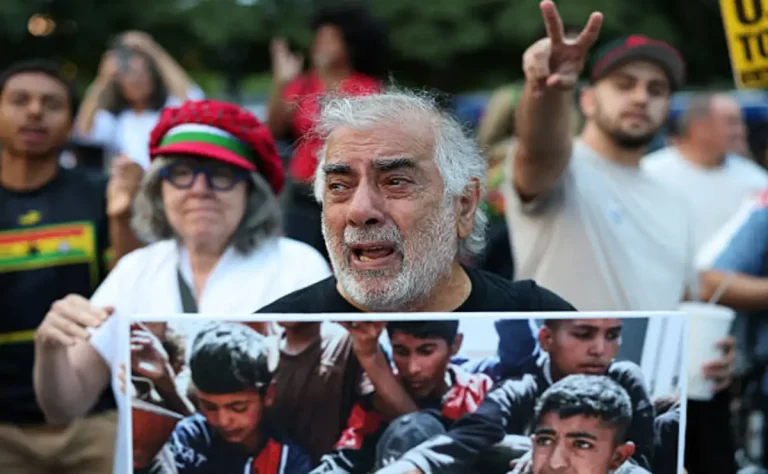
Mohamed Salah of Liverpool in the pre-season friendly versus Athletic Club Bilbao at Anfield, Liverpool. Robbie Jay Barratt - AMA/Getty Images
Palestinian Pelé death explanation appears central to public debate
Al-Obeid, widely described in coverage as the “Palestinian Pelé,” was reported to have been killed while waiting for humanitarian aid in southern Gaza.
The Palestine Football Association (PFA) stated he died in an Israeli strike; that detail, and the broader circumstances surrounding the incident, were not included in UEFA’s initial message, which simply paid tribute to his contribution to the game.
Salah, one of the highest-profile Arab players in world football, used the platform of his social media to highlight that omission.
His comment resonated with supporters and observers who argued that terse statements from major institutions can appear to sidestep facts when lives lost are tied to political or military events.
The PFA has emphasised Al-Obeid’s role as a national icon who scored more than 100 goals in a long career and who inspired children in Gaza.
Independent reporting and humanitarian agencies have also documented civilian deaths near aid distribution sites in Gaza during the current conflict; those broader figures have been cited in coverage of the region’s humanitarian toll.
UEFA transparency in crisis statements faces renewed scrutiny
UEFA’s initial post described Al-Obeid as “a talent who gave hope to countless children, even in the darkest of times.” Critics, including Salah, said the message lacked the factual context necessary to understand the circumstances of the death.
In response to the criticism, the PFA published what it said was a letter from UEFA president Aleksander Čeferin expressing condolences, but attention remained focused on the original omission.
Questions over institutional language in times of crisis are not new. Observers and communications experts note that organisations often aim to balance political neutrality with moral clarity; where that balance falls can shape public perception.
In this instance, Salah’s intervention placed that balance at the centre of discussion within football circles and among the wider public.
Coverage that first reported Al-Obeid’s death attributed both the fatal strike and the scene in southern Gaza to local accounts and the PFA, prompting the immediate public response from Salah and others. UEFA has not expanded its initial tribute into a fuller public account explaining the omission of details.
For many observers, the issue is straightforward: when a prominent figure dies under contested or violent circumstances, stakeholders expect institutions to provide clear factual information rather than leave readers and supporters to infer context.
Supporters of organisations that prioritise concise statements argue that brevity avoids speculation; critics say brevity can become a form of erasure when it omits material facts.
People close to the football community described Al-Obeid as a veteran striker who had played for the Palestinian national team and remained a symbol for younger players.
The PFA’s tally, published since the conflict escalated in October 2023, records hundreds of deaths within the football community, a figure that has contributed to the sense of urgency in the public response to this case.
Mohamed Salah’s Response to Gaza footballer’s death underscores wider humanitarian concerns
Salah’s public stance follows earlier appeals he has made for humanitarian access to Gaza and for reductions in civilian harm.
His questions about UEFA’s wording are consistent with those appeals and reflect a broader call by athletes and sports figures for organisations to adopt clearer, more accountable communications when events intersect with human suffering.
Analysts say the incident may prompt governing bodies to review how they issue statements on deaths that arise within conflict zones. A measured and transparent approach — one that cites verifiable facts and acknowledges uncertainty where it exists — can reduce speculation and build public trust. Conversely, a failure to provide factual context can invite criticism and prolong controversy.
UEFA’s social media message and the PFA’s account of Al-Obeid’s death remain focal points for coverage. Media outlets and observers have juxtaposed the short tribute with the PFA’s description of the circumstances, and reactions from high-profile players like Salah have amplified the issue in sports pages and on social networks.
Also Read: Over 60,000 killed in Gaza since start of Israel-Hamas war, Gaza health ministry says
Mohamed Salah’s intervention did not call for policy change at UEFA; it demanded factual clarity. Whether that demand leads to a change in institutional wording or communication policy remains to be seen, but the episode has already influenced the conversation about how the sport’s authorities handle statements linked to human tragedy.



